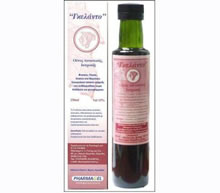
Λεξικό .. Bermuda grass [(L) Cynodon Dactylon, (Ger) Hundszahngras, (Fr) Cynodon dactyle]
Bermuda grass is considered one of the most allergenic grasses. According to American allergy survey, Bermuda grass was shown to cause the highest incidence of sensitivity among grass allergens. It is found all over Europe (but not in Scandinavia), South Africa, Australia, USA, India and Japan. It is the dominant forage grass of Brazil, it flowers around Mediterranean from May to
August, in North America from April/May to September/October. It shows moderate crossreactivity to Johnson grass and Bahia grass but
a very limited relation to other grasses such as Timothy or Rye grass. Cyn d 1 is the major allergen of Bermuda grass pollen (See Cyn d 1) [1]. Bermuda grass is symbolized in RAST,UniCAP/Pharmacia CAP System Allergens as g2.
Cynodon dactylon is one of the 10 auspicious herbs that constitute the group Dasapushpam in Ayurveda. Traditionally Cynodon dactylon L. is used against many chronic inflammatory diseases in India. The present study was carried out to evaluate the protective effect of Cynodon dactylon against rats with adjuvant- induced arthritis. Arthritis was induced by intradermal injection of complete Freund's adjuvant into the right hind paw produce inflammation of the joint. A significant increase in the levels of inflammatory mediators, myeloperoxidase, nitrite, C-reactive protein, ceruloplasmin was observed. This was associated with oxidative stress with a marked reduction in the activity of catalase, superoxide dismutase, glutathione peroxidase and the levels of glutathione, vitamins C and E and an increase in the lipid peroxidation as indicated by the higher levels of thiobarbituric acid reactive substances. Cynodon dactylon (20mg/kg/b.wt) was orally administered to arthritic rats after adjuvant injection produced a significant attenuation in the inflammatory response, oxidative stress and ameliorated the arthritic changes to near normal conditions. Hence, the results of this study clearly indicate that Cynodon dactylon extract has a promising protective role against arthritis [2].
Fresh juice of Cyanodon dactylon known as 'durva' grass is employed in India as a rejuvenator and for wound healing. It has been demonstrated in mice the DNA protective activity and immunomodulatory property of the fresh juice of Cynodon dactylon validating the traditional use of the herb as a 'rasayana' in ayurvedic system of medicine [3]. Thus, the aim of the current study is to evaluate the effect of Cynodon aqueous extract as a preventive and curative agent in experimentally induced nephrolithiasis in a rat model. Cynodon dactylon (Poaceae family) decoction was used in the treatment of kidney stones. Atmani F, et al (2009 investigated the effect of Cynodon aqueous extract as a preventive and curative agent in experimentally induced nephrolithiasis in a rat model. They concluded that C. dactylon extract has beneficial effect in preventing and eliminating CaOx deposition into kidneys. Such findings provide a scientific explanation for its use in the treatment of kidneys stones [4].
References
1. Brown W.G. et al: The relationship of respiratory allergy, skin test reactivity and serum IgE in a community population sample. J. Allergy Clin. Immunol. 63 (1979) 328-335.
2. Sindhu G, Ratheesh M, Shyni GL, Helen A. Inhibitory effects of Cynodon dactylon L. on inflammation and oxidative stress in adjuvant treated rats. Immunopharmacol Immunotoxicol. 2009 Jul 6.
3. Mangathayaru K, Umadevi M, Reddy CU. Evaluation of the immunomodulatory and DNA protective activities of the shoots of Cynodon dactylon. Ethnopharmacol. 2009 May 4;123(1):181-4.
4. Atmani F, Sadki C, Aziz M, Mimouni M, Hacht B. Cynodon dactylon extract as a preventive and curative agent in experimentally induced nephrolithiasis. Urol Res. 2009 Apr;37(2):75-82.
Γκέλης Ν.Δ. - Λεξικό Αλλεργίας - Εκδόσεις ΒΕΛΛΕΡOΦΟΝΤΗΣ - Κόρινθος 2013
Gelis Ν.D. - Dictionary of Allergies - VELLEROFONTIS Publications - Corinth 2013




